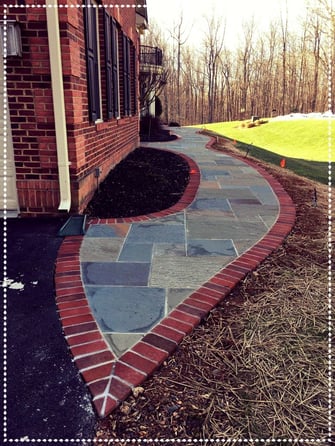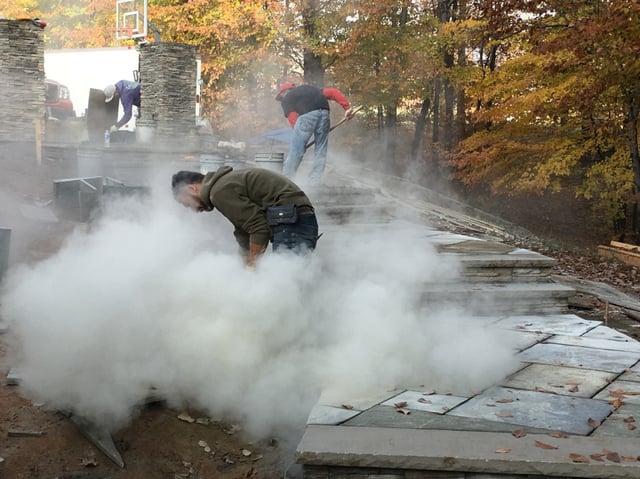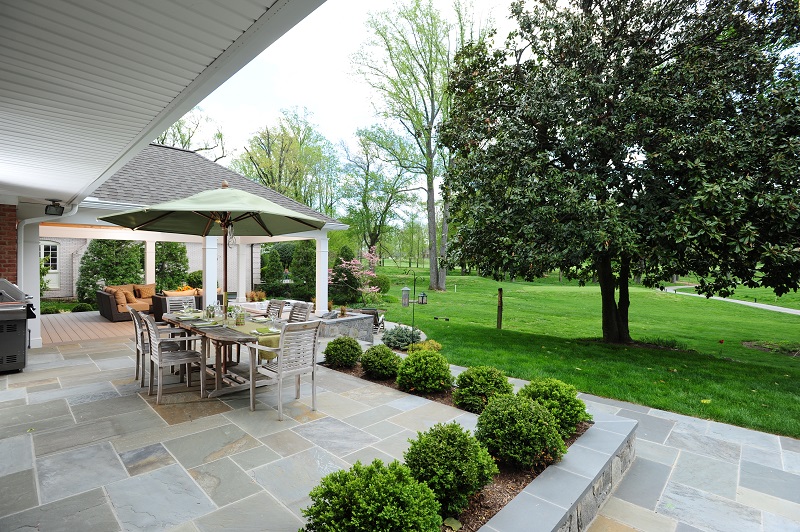6 criteria for determine the best patio material in Maryland and Virginia
If you’re considering adding a patio to your house, you’re probably wondering what materials are best to use. Should you use flagstones? What about pavers? How can you get the best possible patio for you? Unfortunately, the answer isn’t a simple one, and that last question should largely tell you why – because it depends on what you want and can afford.
So let’s ask a better question: what are you looking for in a patio? There are all kinds of things that you may want to consider, but below we have listed the most common factors why people decide to go with one kind of patio material over another.
- Cost matters. Without exception, any time you’re pouring a concrete slab and then putting your patio material on top of this, it’s going to be significantly more money than simply using pavers that don’t require a slab. Beyond this, if your patio uses grout joints, you are guaranteed to have issues 5 to 10 years down the road, and it is something that is costly to fix. So there are two things to consider: your upfront cost as well as your long-term cost. If cost is the primary concern, pavers usually win out on both fronts.

- Build it and forget it. While there is no patio material that won’t require any maintenance at all, some are definitely easier – and cheaper – than others to upkeep. As mentioned above, patios with grout joints – such as flagstone patios – will demand a big and expensive fix within a decade of adding them. Pavers may also need to be replaced from time to time, but generally speaking, this is a process that is relatively inexpensive and simple to accomplish.
- All about the look. Perhaps neither of those above categories describe you. Maybe money is no object where materials are concerned, and you don’t mind hiring someone to do any upkeep that’s needed. What matters to you are aesthetics: you want your patio to look good, and don’t mind going the extra mile to have it finished like an interior tile floor. In this case, you probably want to go with a natural product rather than a manmade one. A popular high-end material in this area is Western Pennsylvania flagstone, but others exist that are of similar quality.
- Matching the existing aesthetic. Speaking of “the look,” regardless of how much you desire to spend, or how much upkeep you want to do, one thing you should certainly consider is doing your best to make sure that your patio matches your house. Generally, you don’t want to select a color that’s very close but not quite the same as an existing material on your home, because this often results in a mismatched look. Instead, choose colors and materials that complement your existing home. This is important, or you’ll end up with a patio that feels out of place and detracts from the resale value of your home if you ever decide to move.
- Works with the pool. People who have pools in their backyards need to pay extra special attention to the type of materials they use for their patios. Why? Because you don’t want something that’s going to get blisteringly hot in the summer sun and burn your bare skin as you – or your kids – run around the pool and climb in and out of the water. This is one of those times where economy meets common sense, because while more expensive materials may look nice around your pool, pavers are generally better because they don’t retain as much heat.

Random Pennsylvania flagstone patio installation in Clifton, Virginia. Design Builders installs patios in Virginia and Maryland.
- You need a space that’s permeable. You can only have 35 percent coverage of non-permeable surfaces. If you have a modest yard or a large space that you want to convert into a patio, this can pose a problem for many materials. Pavers, however, are a good solution to this issue, because they can be installed for permeability so that they essentially don’t count against your permeable space.
So, as you can see, there are a number of factors to consider when determining what is the best material to use for a patio. Your best bet is to work with an experienced patio contractor who can listen to your needs and advise you on the materials that fit the bill.

.jpg?width=800&name=a_Porch_Deck_Patio_Emman_(15).jpg)
